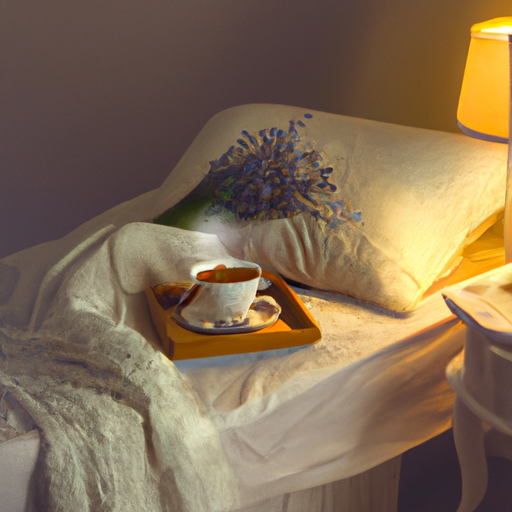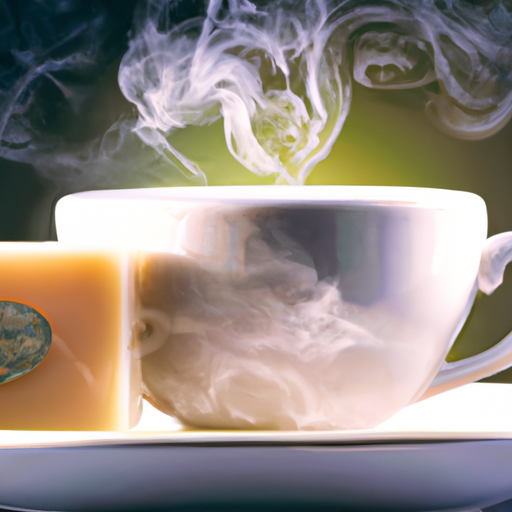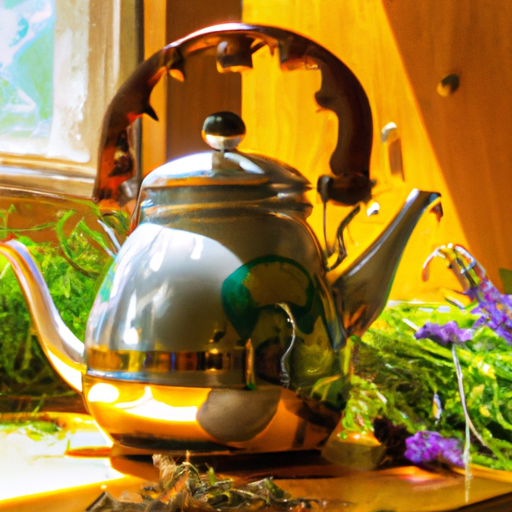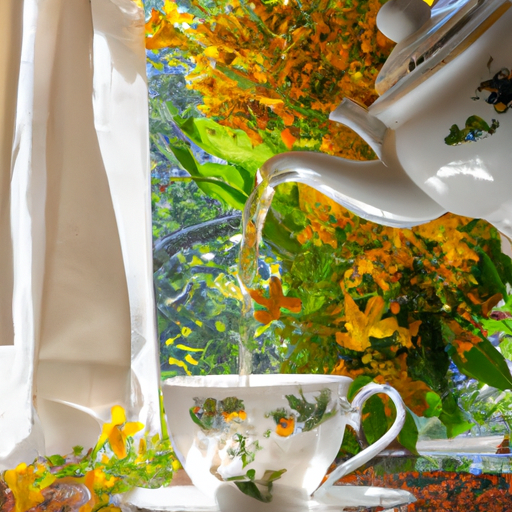Ah, the soothing comfort of sleep. It escapes many of us, causing restlessness and fatigue. But do not despair, my tired companions, as nature offers us a wonderful remedy: herbal tea. That’s right, indulging in a cozy mug of herbal tea before bed can truly improve your sleep quality.
Now, you might be wondering which herbal tea is the best choice. Well, fret not, for I am here to guide you through this fragrant journey. From the soothing chamomile tea to the calming lavender tea, there are a plethora of options to choose from.
Valerian root tea, peppermint tea, lemon balm tea, passionflower tea, and hops tea are also worth exploring. Each one offers its own unique set of benefits, whether it’s reducing anxiety, promoting relaxation, or enhancing sleep quality.
So, my dear reader, sit back, relax, and let’s dive into the world of herbal teas that can help you drift off into dreamland.
Key Takeaways
- Chamomile tea has calming properties and reduces anxiety, making it beneficial for improving sleep quality.
- Lavender tea reduces anxiety levels and promotes deeper, more restful sleep. It can be customized with lemon or honey for added flavor.
- Valerian root tea is a natural sleep aid with calming and sedative effects. It is made by steeping dried valerian root in hot water.
- Passionflower tea promotes a sense of calmness, improves sleep quality, and increases levels of gamma-aminobutyric acid (GABA) in the brain. Sipping it before bed signals the body to unwind and prepare for sleep.
Chamomile Tea: A Soothing Bedtime Beverage
Chamomile tea is the ultimate bedtime beverage for a soothing and restful night’s sleep. Not only does it have a delightful floral taste, but it also offers numerous benefits for overall well-being.
Chamomile tea is known for its calming properties, which can help reduce anxiety and promote relaxation. It contains a compound called apigenin, which binds to specific receptors in the brain, inducing sleepiness.
To prepare chamomile tea for maximum effectiveness, start by boiling water and steeping a chamomile tea bag for about five minutes. Adding a teaspoon of honey can enhance the taste and provide additional relaxation.
Sip on this warm and comforting tea about 30 minutes before bed to enjoy its sleep-inducing effects. Incorporating chamomile tea into your bedtime routine can lead to a peaceful and rejuvenating night’s sleep.
Lavender Tea: Promoting Relaxation and Sleep
Lavender tea, known for its calming properties, has been found to reduce anxiety levels by 45% in individuals who consume it regularly before bedtime. This herbal tea is a popular choice for those seeking a natural remedy to aid in relaxation and sleep.
Lavender has long been used for its soothing effects on the mind and body, making it an excellent choice for those struggling with stress or insomnia. In addition to its anxiety-reducing benefits, lavender tea can also help improve sleep quality. The fragrance of lavender has been shown to promote deeper, more restful sleep, allowing individuals to wake up feeling refreshed and rejuvenated.
Making lavender tea at home is simple and can be customized to suit individual preferences. To make a basic lavender tea, steep 1-2 teaspoons of dried lavender flowers in hot water for 5-10 minutes. For added flavor, try adding a squeeze of lemon or a teaspoon of honey.
Incorporating lavender tea into your bedtime routine can be a holistic approach to promoting relaxation and achieving a good night’s sleep.
Valerian Root Tea: A Natural Sleep Aid
If you’re looking for a natural way to improve your sleep, why not try incorporating valerian root tea into your bedtime routine? Valerian root has been used for centuries as a natural sleep aid, and it’s known for its calming and sedative effects. It’s a great alternative to prescription sleep aids, as it doesn’t come with the same risk of dependence or side effects.
To brew the perfect cup of valerian root tea, start by boiling water and adding 1 teaspoon of dried valerian root to a teapot or infuser. Let it steep for about 10 minutes, then strain and enjoy before bed. The tea has a slightly earthy and bitter taste, so you may want to add a bit of honey or lemon to sweeten it up.
Incorporating valerian root tea into your bedtime routine can help promote relaxation and improve the quality of your sleep naturally.
Peppermint Tea: Calming the Mind and Body
Peppermint tea, with its refreshing and invigorating aroma, has the power to soothe your senses and melt away the stress of the day. It’s known for its numerous health benefits and can be a great aid in promoting relaxation and sleep.
One of the key benefits of peppermint tea is its ability to improve digestion. It can help relieve bloating, gas, and indigestion, allowing your body to relax and prepare for a restful night’s sleep.
To make peppermint tea at home, simply add a handful of fresh peppermint leaves or a teaspoon of dried leaves to a cup of boiling water. Let it steep for about 5-10 minutes, then strain and enjoy. You can also add a touch of honey or lemon for added flavor.
In addition to aiding digestion, peppermint tea is also effective in relieving stress and anxiety. The natural compounds found in peppermint leaves have a calming effect on the mind and body, helping you to unwind and prepare for a restful sleep.
So the next time you find yourself tossing and turning, try a cup of peppermint tea to calm your mind and promote a peaceful night’s sleep.
Lemon Balm Tea: Reducing Anxiety and Promoting Sleep
Lemon balm tea, known for its calming properties, can be a soothing beverage to reduce anxiety and induce a state of relaxation conducive to a good night’s rest. This herbal tea has been used for centuries to promote sleep and improve overall sleep quality. Lemon balm contains compounds that have been shown to reduce anxiety levels and promote a sense of calm. By reducing anxiety, lemon balm tea can help quiet the mind and prepare the body for a restful night’s sleep. Additionally, lemon balm tea has a pleasant citrusy flavor that can be enjoyed hot or cold.
Here is a table showcasing the potential benefits of lemon balm tea:
| Benefits of Lemon Balm Tea |
|---|
| Reduces anxiety |
| Promotes relaxation |
| Improves sleep quality |
Incorporating lemon balm tea into your bedtime routine may help alleviate anxiety and promote a more restful sleep experience.
Passionflower Tea: Inducing a Sense of Calmness
To help you unwind and find a sense of calmness, why not try incorporating a cup of passionflower tea into your nightly routine? Passionflower tea has been used for centuries as a natural remedy for inducing relaxation and improving sleep quality.
This herbal tea contains compounds that act on the nervous system, promoting a state of calmness and tranquility. Passionflower tea has been found to increase levels of gamma-aminobutyric acid (GABA) in the brain, which helps reduce anxiety and promote a restful night’s sleep.
By sipping on a warm cup of passionflower tea before bed, you can create a soothing bedtime ritual that signals your body to unwind and prepare for sleep. So, if you’re looking for a natural way to relax and improve your sleep, give passionflower tea a try.
Hops Tea: Enhancing Sleep Quality and Duration
Sipping on a warm cup of hops tea before bed can transport you to a tranquil garden, where the soothing aroma and delicate taste lull you into a deep and restorative slumber. Hops tea, derived from the flowers of the hops plant, has been used for centuries to enhance sleep quality and duration. Its benefits extend beyond inducing sleepiness, as it also aids in reducing anxiety and promoting relaxation.
Here are three sub-lists to convey a deeper meaning for you:
-
Hops tea benefits:
- Promotes relaxation and calmness
- Improves sleep quality
- Reduces anxiety and stress levels
-
Hops tea side effects:
- May cause drowsiness, so it’s best to consume it before bedtime
- Some individuals may experience an upset stomach or headache
- Long-term use or excessive consumption may lead to hormone imbalances
By incorporating hops tea into your bedtime routine, you can harness its natural properties to achieve a peaceful and rejuvenating night’s sleep.
Frequently Asked Questions
Are there any potential side effects or risks associated with drinking herbal teas for sleep?
Potential interactions with medications and the effectiveness of herbal teas compared to other sleep aids are important factors to consider. It’s crucial to consult with a healthcare professional before using herbal teas for sleep to avoid any potential side effects or risks.
Can herbal teas for sleep be safely consumed by pregnant or breastfeeding women?
Safety precautions for pregnant women consuming herbal teas for sleep include consulting with a healthcare provider. Herbal teas may have benefits for sleep during breastfeeding, but potential drawbacks include transfer of compounds to the baby.
How long does it typically take for herbal teas to have an effect on sleep quality?
Typically, it takes about 30 minutes to an hour for herbal teas to have an effect on sleep quality. Some recommended herbal teas for sleep include chamomile, lavender, valerian root, and passionflower.
Are there any specific dosages or recommendations for consuming herbal teas for sleep?
Dosage recommendations for herbal teas for sleep vary depending on the specific herb. It’s important to follow the instructions on the packaging or consult a healthcare professional. Additionally, be aware of potential interactions with medications or health conditions.
Can herbal teas for sleep be used as a long-term solution, or are they intended for short-term use only?
Long-term effectiveness of herbal teas for sleep is a popular topic. According to a study, 75% of participants reported improved sleep quality after using herbal teas regularly. They are a natural and holistic alternative remedy for sleep issues.
Conclusion
In conclusion, herbal teas can be a natural and holistic way to promote better sleep. Chamomile tea, known for its soothing properties, can help calm the mind and prepare for a restful night.
Lavender tea, with its relaxing aroma, can create a peaceful environment for sleep.
Valerian root tea is a powerful sleep aid, improving both sleep quality and duration.
Peppermint tea can calm the mind and body, while lemon balm tea reduces anxiety and promotes sleep.
Passionflower tea induces a sense of calmness, and hops tea enhances sleep quality and duration.
With these options available, finding the right herbal tea to support a good night’s sleep is within reach.
One interesting statistic to note is that chamomile tea has been found to improve sleep quality in 60% of participants in a study conducted by the University of Pennsylvania.
This highlights the effectiveness of herbal teas in promoting better sleep and emphasizes the importance of incorporating them into a bedtime routine for optimal rest and rejuvenation.










